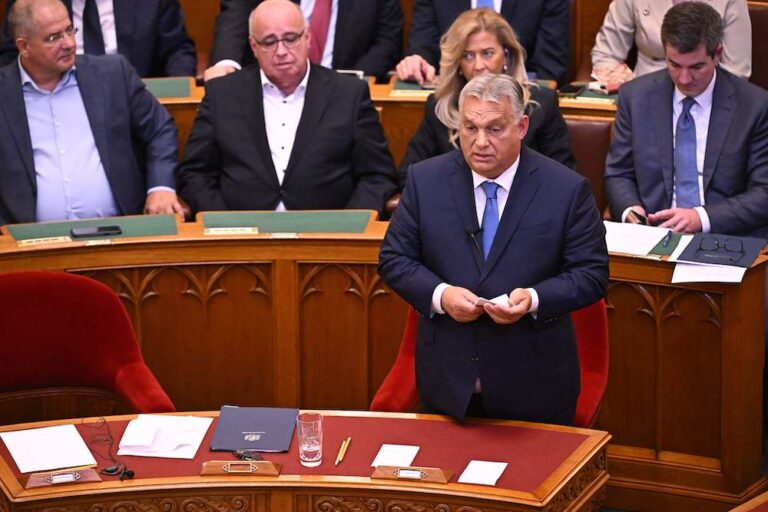Organisations have called for for a strong and effective response from the European Parliament, critical of the Hungarian government's continued attack on independent institutions, including academic institutions, civil society organisations and media.
This letter was originally published on rsf.org on 26 April 2017.
Member of the European Parliament,
Rue Wiertz
1047 Brussels
25 April 2017,
Dear Member of the European Parliament,
CALL ON THE EUROPEAN PARLIAMENT TO ADOPT RESOLUTION ON THE SITUATION IN HUNGARY
In view of the situation in Hungary, we are writing to request your active intervention to support civil society, press freedom, academic freedom, the rule of law and fundamental rights in Europe.
Attacks on independent universities and civil society organisations
We are concerned by the Hungarian government’s recent moves to stigmatise and obstruct the work of civil society organisations and to threaten the Central European University. These developments are bound to have negative implications for Hungarian society and for the respect of human rights and the rule of law in Hungary. These actions are contrary to the EU’s founding principles as enshrined in Article 2 TEU.
We are especially concerned about the draft law ‘on the Transparency of Organisations Receiving Foreign Funds’ (T/14967), submitted to the Hungarian Parliament on 7 April 2017 and currently under discussion. The law is unnecessary as existing legislation already ensures transparency and accountability for NGOs. It is discriminatory, as it seeks to target some civil society organisations, while others such as sport or religious associations would be exempted.
The law would force NGOs receiving more than 7.200.000 HUF (approx. € 24,000) per year from abroad to register as “civic organisations receiving foreign funding”. This includes funding from EU sources not managed by a Hungarian institution. Organisations which will fail to comply with the new law would face sanctions up to dissolution. Thinly disguised as an attempt to protect Hungarian interests, this law, modelled on Russia’s foreign agent law which both the EU and international rights experts have criticised as a tool to silence independent civil society, would have the opposite effect. Indeed, it would further shrink the space for independent civil society organisations which protect human rights and deliver valuable services to society. This is particularly disquieting at a time when other checks and balances have already been significantly weakened in Hungary.
Statements by Hungarian government officials on civil society organisations – including in the context of the recently launched national consultation ‘Let’s stop Brussels!’ – further demonstrate a clear intent by the government to stigmatise and intimidate independent groups and harm their reputation. The consultation accuses international NGOs operating in Hungary of interfering “in internal affairs […] in a non-transparent way” and of inciting “illegal immigrants […] to commit illegal acts”. Furthermore, the draft bill’s stated aim draws an unwarranted link between international money-laundering, terrorism and civil society organisations that operate in Hungary with foreign funding.
Civil society organisations are an integral part of the broader civil society. Ensuring an enabling environment for civil society is an obligation under international human rights law. A vibrant and independent civil society that contributes to strengthening the rule of law and human rights and ensures accountability for public action is an essential element of the rule of law.
Continued violations of the rights of asylum-seekers and migrants
Concerning migration, the latest comprehensive set of amendments to Hungarian asylum laws, adopted on 7 March, allows for the blanket detention, solely on the ground of their immigration status, of almost all asylum-seekers, including children above 14, in border “transit zones” for the whole duration of their asylum process, including any appeals. It also enables the push-back (summary expulsion) of all persons found in an irregular situation in Hungary to the external side of the country’s extensive border fences. These measures violate the rights of asylum-seekers and migrants who enter the territory of Hungary. They are in breach of the EU Reception Directive, international refugee law and the European Convention on Human Rights, and represent another clear risk of serious breaches of the EU’s founding principles as enshrined in Article 2 TEU.
Attacks on media freedom
Finally, the Hungarian government has been steadily and worryingly tightening its grip on media since Viktor Orbán came to power in 2010. The restrictions on media pluralism and press freedom took several forms including new legislation which severely curtailed free speech and had a chilling effect on media, increased government control over public media, and economic pressure on privately-owned media, which in turn have led to a serious rise in soft and self-censorship.
The latest major attack against media pluralism came only a few months ago, in October 2016, when both the print and online editions of Hungary’s leading opposition daily newspaper, Népszabadság, were closed. Although the owner claimed that the suspension was based exclusively on financial grounds, it became apparent that the closure of the most influential left-liberal daily was politically motivated.
European Parliament resolution warranted
In view of the European Parliament’s debate on the situation in Hungary on Wednesday 26 April, we call for a strong and effective response, critical of the Hungarian government’s continued attack on independent institutions, including academic institutions, civil society organisations and media. These attacks blatantly violate European and international rule of law and human rights standards and must be firmly condemned.
The severity of the current situation and the breadth of the measures recently introduced and proposed warrant a new resolution by the European Parliament on the situation in Hungary. They add to an already grim picture where democratic checks and balances have been severely undermined and the rule of law is under serious threat.
While issues leading to the resolutions adopted by this Parliament on Hungary between 2011 and 2015 have not been fully addressed and resolved, new issues have continued to arise including those listed above. The recent developments should not be discussed as isolated events, but rather seen and addressed in light of a constant backsliding on the rule and law and human rights for several years on end. What is happening in Hungary today is a deliberate targeting of various groups in society, with particular impact on people who are already marginalised and deprived. Constitutional protection has been lowered and independent institutions are at risk of falling under the control of the government. This results in a situation where there is a systemic threat to the rule of law in Hungary and where the rule of law safeguards that should guarantee its respect at the national level no longer seem capable of effectively addressing this threat.
A new resolution by the European Parliament should call on Hungarian authorities to repeal the amendment to the National Higher Education Law signed into law on 10 April, also known as ‘Lex CEU’. Further, the European Parliament should firmly condemn the draft NGO law and urge the Hungarian parliament to reject this law, which represents a major threat to civil society in Hungary.
The European Parliament should acknowledge that the recent developments, alongside previous attempts to undermine checks and balances and restrict human rights in Hungary, constitute a systemic threat to the rule of law in this member state and urge the European Commission to do the same.
The Commission should at the very least stick to its commitment to start or continue all its investigations on possible breaches of EU law by Hungary and move forward with infringement actions under Article 258 TEU as warranted, particularly where there clearly is a breach of EU law as in the case of the asylum law. The European Parliament should as a matter of urgency request an analysis from the EU Fundamental Rights Agency (FRA) on compliance of the newly proposed laws with the Charter of Fundamental Rights of the EU. But as acknowledged by the Commission, ensuring legal compliance will not suffice to stop the abuse, especially when the rule of law is under threat. The European Parliament should therefore urge the European Commission to fully uphold its role as guardian of the treaties and, as a minimum, place Hungary under the scrutiny of its EU Framework to strengthen the rule of law.
We also call on the European Parliament to lead the way and commit to laying out a reasoned proposal to the European Council to activate the preventive mechanism foreseen under Article 7 (1) TEU, in order to protect the EU’s founding values as enshrined in Article 2 TEU.
Finally, we call on the European Parliament to urge the Council of the European Union once again to put the situation in Hungary on its agenda and adopt conclusions, in light of EU law and article 2 TEU.
In keeping with the founding principles of the EU, we urge you to ensure that all members of the European Union defend the role of civil society in promoting open societies that respect and protect human rights and the rule of law. The European institutions should all play their part in supporting civil society across Europe.
Yours sincerely,
Julie Majerczak
Head of Brussels Office
Reporters without Borders
Dan Van Raemdonck
Secretary-General
FIDH
International Federation for Human Rights
Dominique Guibert
President
AEDH
European Association for the Defence of Human Rights
Iverna McGowan
Head of European Institutions Office And Advocacy Director
Amnesty International
Natacha Kazatchkine
Senior Policy Analyst
Open Society European Policy Institute
Philippe Dam
Advocacy Director for Europe and Central Asia
Human Rights Watch



